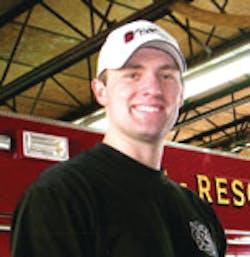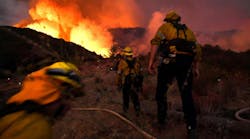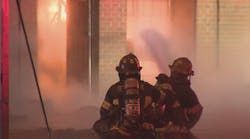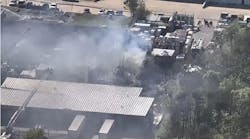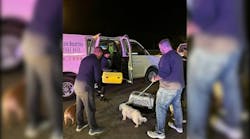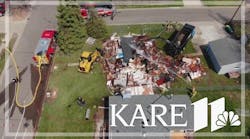This two-part column looks at those times when we know there is potential violence and when we do not know. We look at a working vehicle fire in Missouri at which a firefighter was shot and killed, a house fire in New York where firefighters conducting a search “found a victim aiming a gun at them” and a traffic accident at which a New York firefighter was shot in the back.
Our thanks to Chief Terry Merrell and the officers and members of the Maplewood, MO, Fire Department, in memory of Firefighter/Paramedic Ryan Hummert; Chief John Randazzo and First Assistant Chief James A. Campbell Jr. and the officers and members of the West Babylon, NY, Fire Department; and Chief Robert Taylor, Firefighter/EMT Justin Angell and the officers and members of the Bellmore, NY, Fire Department for their assistance and cooperation.
To stage or not to stage
Throughout fire and EMS history, there have been incidents that have resulted in the shooting, injury or death of firefighters. In so many cases, the incidents were avoidable. In those cases, the avoidability often becomes apparent when we are advised or know that there may be a weapon or a scene of potential Tiolence.
While we as firefighters and EMTs are “programmed” to do all we can to help someone, there are times when we simply cannot help until the scene is secure. First and foremost, these are police incidents first – and we then respond in when the scene is safe. As tempting as it may be, we cannot place ourselves or our personnel in harm’s way when we have information that there may be a violent related risk for us. Simply put – wait for the police.
“But someone may die and bleed out before the police arrive.” Understood, but wait for the police or you and your personnel may be the next target. “But I can see the victim lying right there. I can get to him quickly.” Understood, but again, wait for the police or you and your personnel may be the next target. “But people are yelling for us to come into the scene and help them – they need our help right away!” OK, what part of “wait for the police or you and your personnel may be the next target” do you not understand?
In those cases when you have information that the scene may be one of violence, consider these steps, as recommended by National Institute for Occupational Safety and Health (NIOSH), for your department to minimize the risk of similar occurrences:
• Develop standard operating procedures (SOPs) for responding to potentially violent situations
• When the slightest question or doubt exists, stage or remain in quarters until police determine the scene is safe
• Develop integrated emergency communication systems that include the ability to directly relay real-time information between the caller, dispatch and all responding units, including EMS, police and the fire department
• Make sure dispatchers, who often also handle police matters, understand that fire and EMS are part of the response and must know all the information that they may be giving to the police; the role of those in the communications center (or multi-communication centers) to effectively communicate and ensure the passing of information is a matter of life and death
• Provide body armor or bullet-resistant personal protective equipment (PPE) and train on and consistently enforce its use when responding to potentially violent situations
• Ensure all emergency response personnel have the capability for continuous radio contact and consider providing portable communication equipment that has integrated hands-free capabilities
• Consider requiring emergency dispatch centers to incorporate the ability to archive location, or individual, historical data and provide pertinent information to responding fire and emergency medical services personnel
• Develop coordinated response guidelines for violent situations and hold joint training sessions with law enforcement, mutual aid and emergency response departments
The unavoidable: Missouri firefighter shot and killed at a vehicle fire
The intent of this close call piece is to help us identify what clearly is avoidable and what is not. When we have any information that a scene may be violent, we must stage away from the scene and await orders from the police.
Of course, our intent is to help people – when we have the right tools, equipment and conditions. When we have information that the scene may be a “bad” one, the police tell us when it is safe – and no one else. Our instincts that “it may be safe” are nonsense. The scene is not until the police say it is. Unfortunately, some situations that occur to us are unavoidable.
One such case occurred in the early morning of July 21, 2008, when the Maplewood, MO, Fire Department (MFD) received a call for a vehicle fire in a residential neighborhood at 5:40 A.M. This was 22-year-old Firefighter/Paramedic Ryan Hummert’s first fire call. Ryan began his career in August 2007 after graduating from paramedic training. He had just graduated from the St. Louis County Fire Academy in March.
The MFD responded, not unlike any of us would, to the reported truck on fire. What happened when firefighters arrived was unimaginable – a psycho began shooting at them from a house window. The shooter had deliberately set the fire.
Firefighters saw the back of a pickup truck burning and stretched a line, having no idea a gun was aimed at them. Within moments of arrival, a bullet struck and killed Ryan, Maplewood’s youngest firefighter, in the line of duty. No warning. Nothing other than the back of a pickup truck burning. “Shots fired. Firefighter killed in the line of duty.” Two police officers, Adam Fite and Sergeant Mike Martin, were shot and wounded. A crew of Maplewood firefighters and several police officers found themselves in the line of fire and risked their lives that day to save their colleagues and protect residents from a pathological sniper who ultimately took his own life. The members of the MFD will never forget the day that their newest firefighter/paramedic, the son of their former mayor, truly a “hometown” kid, was murdered on arrival at a truck fire.
There was no indication a truck on fire would offer any risks to firefighters or police officers other than the predictable roadway risks and the risks of a burning vehicle. As they responded, they were doing what you and I would do – thinking about apparatus placement, blocking the road, exposures and putting water on the fire. Nothing could have prepared them for the murder of one of their own.
About the MFD: The Maplewood Fire Department has 21 full-time members, consisting of a chief and three crews of six firefighters each and a swingman. All members are firefighter/EMTs or firefighter/paramedics. One member is a fire marshal and building inspector.
“Routine” search: Firefighters find a victim – with a gun aimed at them
On Saturday evening, Nov. 20, 2010, the West Babylon, NY, Fire Department (WBFD) was activated by the Babylon Central Fire & Rescue Alarm Center for a “Signal 13” general alarm, automatic fire alarm, at a single-family dwelling at 4th Street and 9th Avenue. First Assistant Chief Jim Campbell was first due, followed by Second Assistant Chief Pete McArdle. They reported nothing showing, and in fact discussed with each other that they had been there two weeks earlier when the homeowner was somewhat eccentric and would not allow access to investigate an alarm caused by the homeowner working on his oil burner.
At this call, Campbell established command while McArdle approached the front door to investigate. When McArdle attempted to ring the front doorbell, he reported to command that he smelled smoke and that the window was hot. Third Assistant Chief Christine Manzi arrived on scene and immediately performed a 360-degree size-up at the request of command. Manzi reported to command and confirmed she had a fire within the residence, in the center of the home from exposure C.
First-due Engine 1-9-2 was directed to stretch primary and backup lines to the front door to meet McArdle. Second-due Engine 1-9-6 was directed to hit the hydrant to provide a positive water supply to Engine 1-9-2 and send manpower to the front door. Truck 1-9-15 was directed to stay on the avenue side of the structure and send search teams and a forcible-entry team to McArdle at the front door. Suffolk County police officers arrived on the scene and Campbell advised them there was a confirmed fire and forcible entry would occur. This run started as a very routine automatic alarm, but it was anything but routine.
The forcible-entry team opened the front door and a primary line was advanced into the structure, to the left toward the fire. The search team entered the home and took a right-hand lead down a hallway toward the bedroom area of the home. Just as the attack line started to hit the fire, the search team entered one of the bedrooms. With the house on fire and smoke conditions existing, the occupant of the home was on a bed. He suddenly sat up and pointed a shotgun at the search team and told them to get out of his house. The search team immediately retreated, screaming a warning into the radio: “Gun!”
Outside, as the word “gun” suddenly went out over the radio, both search teams and the attack team rapidly retreated from the building. The scene was understandably frantic. Suddenly, the sound of breaking glass occurred, startling everyone staging away from the house. The occupant of the home was breaking the hallway window out with the butt of the shotgun.
Command issued an order for everyone to take cover behind apparatus, as the occupant jumped from the window clutching the shotgun. All fire service members scrambled and jumped through hedges to find safety behind the apparatus. Command immediately put all other responding units, mutual aid units and the rapid intervention team on a “Signal 9” (stand by) several blocks away and asked dispatch for a major Suffolk County Police Department (SCPD) emergency response forthwith, as responders were dealing with an emotionally disturbed person (EDP) with a weapon running around the scene.
SCPD responded in with approximately 10 patrol cars and Emergency Service Section units. Police officers ran toward the scene with weapons drawn. A chase ensued and command ordered all fire personnel to remain under cover until police had the threat under control. Several tense minutes later, gunshots were heard a block or two away. Dispatch advised command that SCPD reported the perpetrator was down and the police were requesting a fire department ambulance forthwith at 6th Street and 8th Avenue. Command sent ambulance 1-9-7 to that location, where the crew found the man who had moments earlier threatened firefighters with a gun now cuffed on the ground and suffering from several gunshot wounds. Ambulance 1-9-7 treated, packaged and transported the perpetrator to Good Samaritan Hospital, where he died from his injuries several days later.
Command then issued orders to McArdle to proceed with extinguishment and investigation activities with extreme caution, as it was known that the occupant was eccentric and obviously disturbed. The fear of possible booby-traps was on everyone’s mind. The attack team reentered the structure and extinguished the remaining fire. It was found that the occupant had set fire to the living room furniture with camping fuel. It was found that all of the doors in the home had padlocks installed on them, so it took an extensive amount of time to investigate safely with the fire department, fire marshal and SCPD.
The members of the search team were removed from the scene by Manzi and brought back to headquarters for counseling and a debriefing by SCPD investigators. The job was completed without physical injury to the members of the West Babylon Fire Department, but it reinforced the concept of always being proactive and taking nothing for granted, because even the most routine alarm can turn deadly within seconds.
About the WBFD: The West Babylon Fire Department is a volunteer organization providing fire and emergency medical services. In 2010, the department responded to more than 3,200 runs, with members responding out of three stations. The WBFD is on the south shore of Long Island, in western Suffolk County, a suburb of New York City. It consists of six fire companies, one rescue unit and one fire police squad. The members staff five engines, one ladder truck and a heavy rescue. In addition, EMS volunteers operate three advanced life support (ALS) ambulances.
Next month: On arrival at a reported single-vehicle accident, Bellmore, NY, Firefighter Justin Angell, responding as a part of an ambulance crew, was shot as he attempted to help a crash victim. With no warning, the victim began firing at firefighters after the victim/shooter crashed his pickup truck into a telephone pole.
